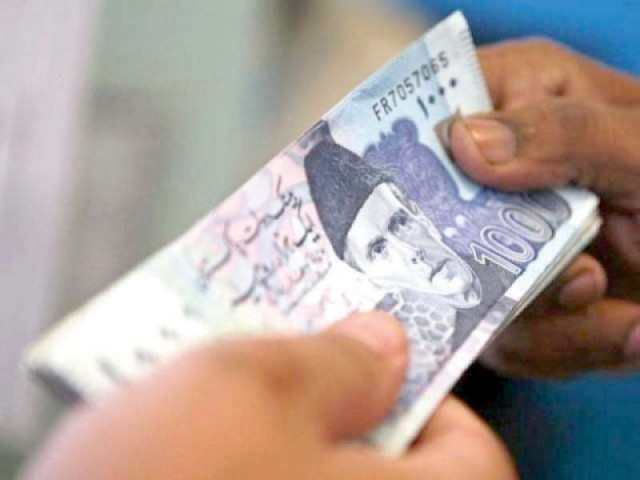No relief: Despite two finance bills, Pakistan's fiscal miseries to persist
Budget deficit to go above 6% of GDP by the end of current fiscal year

FBR spokesman Dr Hamid Ateeq Sarwar said the FBR has collected 40.5% of its target in the first half and will be quite close to the annual Rs4.398-trillion target if economic activity picks up. PHOTO: FILE
In absolute terms, the projected budget deficit is higher than the one left behind by the Pakistan Muslim League-Nawaz (PML-N) government in its last year in power. The feel-good factor that Finance Minister Asad Umar gave to the National Assembly last week was different from what Pakistan told the International Monetary Fund (IMF) last month.
In its draft ‘Pakistan’s Path of Stabilisation and Sustainable Growth’ plan shared with the IMF last month, the finance ministry admitted that in the baseline scenario, the budget deficit would be 6.2% of gross domestic product (GDP). The 6.2% deficit was on the assumption that without additional tax measures the FBR could not collect more than Rs4.1 trillion in revenues, said sources in the finance ministry.
The government has already booked a budget deficit of close to Rs1.1 trillion or 2.8% of GDP in first half of the current fiscal year.
Pakistan and the IMF on Friday also established contact through video link after a hiatus of over one month. But there appeared to be no progress in talks as the finance ministry was moving in the opposite direction.
Budget deficit widens to record Rs2.26tr in FY18
Amid weak capacity of the finance ministry, the Asian Development Bank (ADB) has provided two consultants and one of them is a longtime confidante of the finance minister. The government on Monday also appointed Omar Hamid Khan as special secretary finance.
The finance ministry’s internal projections showed that without taking additional revenue measures the budget deficit would be 6.2% of GDP or Rs2.4 trillion. It also informed the IMF that the current actual revenue collection did not support the achievement of annual revenue target of Rs4.398 trillion.
The ministry’s assessment was that in order to achieve the target, the FBR needed to achieve 27% growth in tax collection in the remaining period of the current fiscal year, which it said looked difficult. It also required additional revenue measures equal to 0.5% of GDP or Rs190 billion.
However, despite knowing the gravity of the situation, the finance ministry did not adjust the fiscal targets.
The government neither revised the budget deficit target nor lowered the FBR’s annual revenue collection target, said Adviser to Finance Ministry Dr Najeeb Khaqan. He voiced hope that the increase in sales tax rates on petroleum products and taxes on mobile phones would boost the revenue collection.
But FBR spokesman Dr Hamid Ateeq Sarwar indicated that the annual target could be missed.
“The FBR has collected 40.5% of its annual target in the first half and will be quite close to Rs4.398 trillion if economic activity picks up in last quarter of the current fiscal year,” Sarwar told The Express Tribune. He said if the FBR could not achieve its annual target, it would not be missed by a wide margin.
The FBR has missed its first-half target by Rs160 billion.
The finance minister put on hold the planned additional revenue measures despite telling the IMF that the foremost concern at this stage should be ensuring the target of Rs4.398 trillion was achieved.
Officials said the minister was advised lately that additional taxes should only be imposed when there was a formal agreement with the IMF. Umar unveiled the amended Finance Bill 2019 in the National Assembly last week to “end anti-business distortions and adopt a pro-growth, pro-investment” economic framework. But the bill lacks both planning and substance.
The measures taken to spur growth will largely benefit a few Karachi-based lobbies, including the automobile sector.
There are also questions being raised over the government’s strategy to boost growth in agriculture, housing and small and medium enterprises by extending tax benefits to banks. The government has not given them direct benefits in the shape of lowering their borrowing cost.
Pakistan’s budget deficit soars to record Rs1.48 trillion
The agriculture sector would get a boost as the government had increased the value of Produce Index Unit from Rs4,000 to Rs6,000, which would allow farmers to borrow more money against the same land, said Khaqan. He said the sector would also benefit from reduction in the gas infrastructure development cess on fertiliser.
In a surprise move, the National Assembly speaker prorogued the session without conducting debate on the finance bill. This gave rise to speculations that the government lacked the majority to get the bill passed from the lower house of parliament.
But Special Assistant to Prime Minister on Parliamentary Coordination Nadeem Afzal Chan said the government was very much interested in getting the bill passed and the new session would be convened very soon.
Umar had also announced that he would unveil a five-year macroeconomic framework on January 23. But the minister delayed the release of the plan as there were still differences over its viability.
The framework draft was under consideration and it would be released only after consulting the full Economic Advisory Council (EAC), said the finance ministry adviser.
Some EAC members had objected to the finance ministry’s decision to exclude them from the planning.
Published in The Express Tribune, January 29th, 2019.
Like Business on Facebook, follow @TribuneBiz on Twitter to stay informed and join in the conversation.



















COMMENTS
Comments are moderated and generally will be posted if they are on-topic and not abusive.
For more information, please see our Comments FAQ